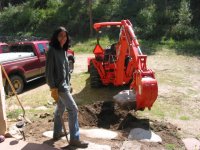rScotty
Super Member
- Joined
- Apr 21, 2001
- Messages
- 9,699
- Location
- Rural mountains - Colorado
- Tractor
- Kubota M59, JD530, JD310SG. Restoring Yanmar YM165D
Just another opinion... I think reliability concerns with older equipment are over blown. Old simple mechanical machines rarely have problems. Your more likely to have problems with a new machine. A mechanical pre-Tier IV emissions tractor is a joy to own.
I agree. New and old, they are both a joy to own - but for slightly different reasons.
The old ones have funky charm, and are simple, inexpensive, easy machines to run and to understand. There's a sense of quality in the heavy duty way even the smallest ones were built. Control systems tend to be mechanical type; electricals are limited to starting....and sometimes lights.
You pretty much have to like gear shifting or power shifting because that's all there is. Power steering is optional and should have been on everything. The hydraulics on the older ones are as good or maybe even a touch better than new models. Even a modest mechanic can make most adjustments himself
The new ones have a shiny finish coupled with way more comfortable seats and control location. They have safety equipment deemed un-necessary for older machines - and that's a good thing. New tractors are somewhat more complex to operate than older ones, but require less wrestling from the operator.
New tractors have the same sense of quality that you find in modern cars where a lot of the strength comes from alloys and the way everything is attached to something else.
They are absolutely loaded with electrical systems, warnings, lights, and accessories. Control systems are usually electrically actuated rather than mechanical type.
New tractors have a range of different transmission types. The HST (hydrostatic transmission) is a joy! They almost always have power steering. Formerly routine adjustments are designed for dealer mechanics to do.
Both new and old will do the same exact work, and the reliability seems to be about equal. Reliability was always of prime importance for tractors, and it was pretty much perfected a generation ago... or before. The biggest difference I notice seems to be in the amount of operator input required. New ones are fingertip control; older tractors take more operator effort with levers and feet.
Regardless of new or old, condition is everything. I can't over-emphasize that. A well-maintained 30 year old tractor can be every bit as reliable as a new one. After a few hundred hours to a few thousand, both new and old are going to be roughly equal in reliability. it's all in how well they are used and maintained.
rScotty

